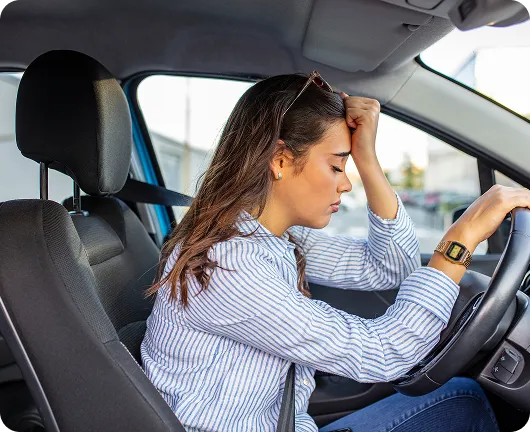Recovering After a Motor Vehicle Accident
Minimally invasive care to ease pain and support recovery

Understanding the Impact of Motor Vehicle Accidents
PMotor vehicle accidents can cause a wide range of injuries—from broken bones and nerve damage to spinal cord, neck, and limb trauma. These incidents may involve cars, motorcycles, or trucks, and the resulting damage can range from mild to debilitating.
Beyond physical harm, vehicle accidents may also trigger emotional and psychological effects. Conditions such as anxiety, depression, or post-traumatic stress disorder (PTSD) may appear following a traumatic crash.
A multidisciplinary approach that addresses both physical and emotional consequences is essential for effective and long-term recovery.
Understanding the Impact of Motor Vehicle Accidents
PMotor vehicle accidents can cause a wide range of injuries—from broken bones and nerve damage to spinal cord, neck, and limb trauma. These incidents may involve cars, motorcycles, or trucks, and the resulting damage can range from mild to debilitating.
Beyond physical harm, vehicle accidents may also trigger emotional and psychological effects. Conditions such as anxiety, depression, or post-traumatic stress disorder (PTSD) may appear following a traumatic crash.
A multidisciplinary approach that addresses both physical and emotional consequences is essential for effective and long-term recovery.

Motor Vehicle Accident Risk Factors
The most common causes of motor vehicle accidents are often preventable. Some of them are related to unsafe driving. These may include:
✔ Distracted driving: Using the phone or eating while driving increases the risk of an accident.
✔ Impaired driving: Driving under the influence of alcohol and drug use is one of the most common causes of motor vehicle accidents.
✔ Exceeding speed limits: Driving faster than legally allowed means that the error range in case of sudden encounters is severely decreased.
✔ Fatigue: Driving while fatigued can mean less attention and focus, increasing the risk of a car crash or other motor vehicle accident.
✔ Weather Conditions: Rain, snow, or fog results in poor driving conditions, potentially increasing the risk of a motor vehicle accident.
Types of Injuries Resulting from Motor Vehicle Accidents
A motor vehicle accident can severely impact different parts of the body. Some injuries may be more severe than others. Medical attention is essential after a motor vehicle accident to rule out internal injuries which may not be evident on the body.
Head and brain injuries: Trauma to the head can cause concussions or more serious brain injuries.
Spinal cord injuries: These may include herniated discs, pinched nerves, spinal stenosis, sciatica, and chronic lower back pain.
Neck injuries: Whiplash, strains, sprains, or cervical radiculopathy are common after collisions.
Bone fractures: Accidents can lead to broken arms, legs, ribs, or pelvis.
Soft tissue injuries: Lacerations, cuts, bruises, and sprains are frequent in car and motorcycle crashes.
Treatment After Motor Vehicle Accidents
Treatment after vehicular accidents may include multiple approaches depending on the kind of injury suffered and its severity.
First Aid
For minor injuries, initial care may include:
✔ Cleaning and disinfecting wounds
✔ Applying bandages
✔ Medications for mild pain and inflammation
Surgery
For deep lacerations, tissue tears, or bone misalignment, surgical procedures may be necessary to repair damage and restore function.
Non-Opioid Medications
These are preferred to reduce pain and inflammation without the risks associated with opioids. Options include:
✔ Anti-inflammatory drugs
✔ Muscle relaxants
✔ Antidepressants (for nerve-related pain)
Injections
Injections offer localized, fast-acting pain relief:
✔ Steroid injections help provide quick inflammation reduction and symptom relief. They target the nerves that send pain signals into the brain, blocking them almost instantly.
✔ Facet joint injections are targeted into the joints on the vertebra, which could be causing nerve compression in the lumbar area due to a physical injury.
Neuromodulation
Neuromodulation aims to reduce nerve stress caused by physical trauma using electrical nerve stimulation. For motor vehicle accidents, the best neuromodulation treatments can involve transcutaneous electrical nerve stimulation (TENS), which uses low-voltage electrical currents to disrupt the transmission of pain signals. Another option could be to use peripheral nerve stimulation, which uses electrical stimulation to target peripheral nerves around the spinal cord for injuries located in the lumbar area.
Minimally Invasive Interventions
Minimally invasive interventions aim to reduce recovery time and the risk of complications from spinal or neck injuries. Some of the best minimally invasive interventions to treat motor vehicle accidents include:
✔ MILD® (Minimally Invasive Lumbar Decompression): Uses imaging guidance and a small needle to remove bone or ligament causing spinal nerve pressure.
✔ Vertiflex (interspinous spacers): Small devices inserted between vertebrae to relieve compression and maintain spinal alignment.
Prevention of Workplace Injuries
The proper usage, storage, and management of tools can often prevent most workplace injuries. Some tips we recommend to avoid physical trauma include:
✔ Performing a proper training program before heavy machinery usage
✔ Having regular workspace inspections to identify potential hazards
✔ Implementing safety policies
✔ Wearing personal protective equipment at all times

Care That’s Close to Home
We offer care from two convenient clinic locations, making it easy to access expert medical support close to home.
Each facility is designed to provide a welcoming, safe, and efficient environment equipped with advanced technology and supported by a compassionate team dedicated to your well being.
Tualatin Clinic
Newberg Clinic
Care That’s Close to Home
We offer care from two convenient clinic locations, making it easy to access expert medical support close to home.
Each facility is designed to provide a welcoming, safe, and efficient environment equipped with advanced technology and supported by a compassionate team dedicated to your well being.
Tualatin Clinic
Newberg Clinic

Why Choose Spinal Diagnostics?
Patients choose Spinal Diagnostics for our comprehensive approach, accurate diagnostics, and compassionate care. We stay at the forefront of interventional procedures and are committed to improving your quality of life—without opioids or invasive surgeries.
Proven Medical Expertise
We bring years of clinical experience in pain management and interventional procedures.
Constant Innovation
We use the latest techniques and technology to ensure safe, effective treatment.
Compassionate Care
We listen, understand, and treat every patient with empathy and respect.
Personalized Plans
Each treatment is tailored to your condition, goals, and lifestyle.
Explore the treatments that bring real relief.
Learn how our non-invasive solutions and personalized plans can help you feel better, faster.
Explore the treatments that bring real relief.
Learn how our non-invasive solutions and personalized plans can help you feel better, faster.

